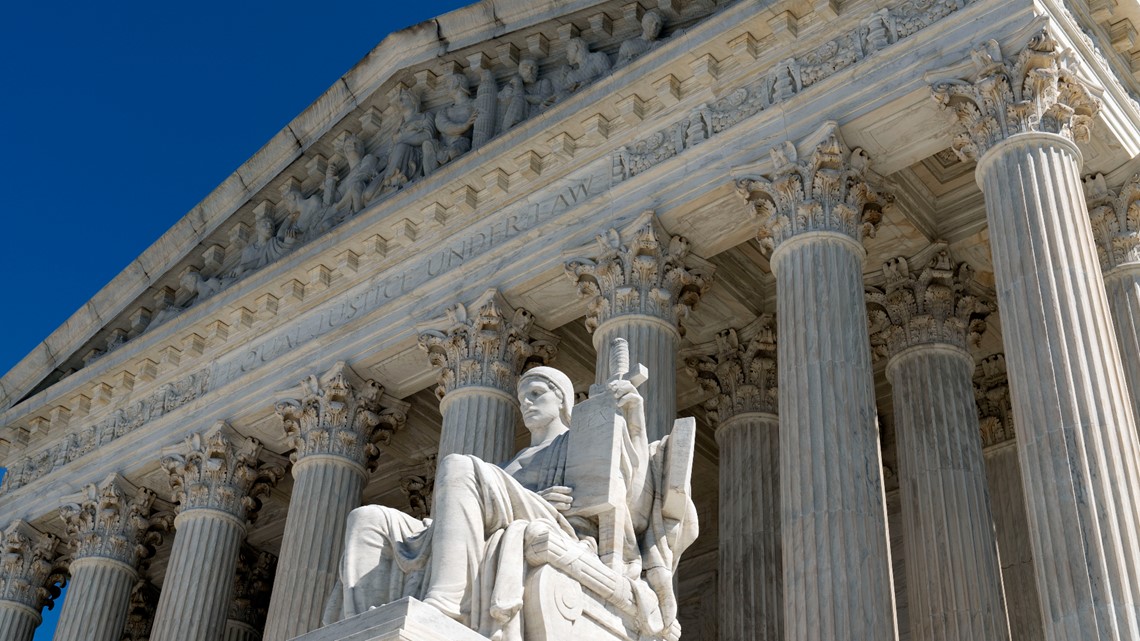In Monday’s session, Judge Ketanji Brown Jackson took part in the arguments for the first time, and the public returned after a years-long pandemic shutdown.
WASHINGTON — The Supreme Court began its new term on Monday with a new justice on the bench, the audience returned to the courtroom and heated debate in a case pitting environmental protection against property rights.
A new member of the court, Judge Ketanji Brown Jacksonwasted no time in joining the lively conversation, asking questions during nearly two hours of argument in the debate over the nation’s main anti-water pollution law, the Clean Water Act.
Jackson, appointed by President Joe Biden, appeared to broadly follow the court’s two other liberal justices in favor of the Justice Department’s arguments for keeping the federal government’s authority to regulate wetlands under the Clean Water Act against a pro-business challenge.
Several conservative justices were more skeptical of the rules in a case testing the Clean Water Act’s reach beyond rivers, lakes and streams.
According to an opinion written by retired Justice Anthony Kennedy in 2006, regulators can require permits before allowing development on properties far from waterways if they prove a substantial connection to the waterways.
Kennedy, who retired in 2018, was in the courtroom to hear some conservative justices appear to agree with the Idaho couple’s attorney that Kennedy’s opinion was vague and inappropriate.
Chief Justice John Roberts was unhappy with Justice Department lawyer Brian Fletcher’s explanation of how to put Kennedy’s opinion into practice.
“What does that mean?” Roberts asked at one point.
Justices Clarence Thomas, Samuel Alito and Neil Gorsuch, who once clerked for Kennedy, also appeared inclined to side with Chantelle and Michael Sackett, who have wanted to build a home near Priest Lake in Idaho for 16 years and won an earlier round of their legal battle in Supreme Court.
The judges heard the arguments for the first time after the publication of a landmark ruling stripping women of constitutional protections against abortion. And for the first time in two and a half years since then court closed in March 2020 due to the coronavirus pandemic, The public was allowed into the courtroom, although the court continues to provide live audio recordings of the arguments on its website.
The court’s reversal of the nearly 50-year-old Roe v. Wade abortion decision is still reverberating in legal battles over state abortion bans and other restrictions. But a a new stack of high-profile cases awaiting trial. Several of the cases the court has agreed to hear deal with race, elections, or both, and the court also agreed to hear a dispute that brings the issue of free speech and LGBTQ rights back to the court.
Also hanging over the judges is an unfinished business from last term: the leak of a draft decision on abortion seven weeks before its official announcement. Chief Justice John Roberts ordered an investigation, but the court has yet to provide an update.
Jackson, for her part, has been waiting months to fully begin her new role after being confirmed in April. She swore when Justice Stephen Breyer retired in Junelate in the term, when the court was also dominated by conservatives by a 6-3 margin expanded gun rights, curbed the government’s ability to deal with climate change and blocked the Biden administration efforts to vaccinate workers at large companies against COVID-19.
Jackson also joins the court at a time of declining public support for the court. Polls after the court’s abortion decision showed a sharp drop in the court’s approval rating and people’s trust in the court as an institution. A poll conducted over the summer found that 43% of Americans said they had little or no confidence in the judiciary, up from 27% earlier this year.
Other notable cases include a controversial Republican-led appeal that could dramatically change the way congressional and presidential elections are conducted by handing more power to state legislatures. There’s also the case of a website designer from Colorado who says her religious beliefs prevent her from working with same-sex couples at their weddings. Next month, the justices will hear a challenge to how race counts in college admissions.
https://www.10tv.com/article/news/nation-world/supreme-court-new-term/507-2bdb0f67-93cb-4737-9d0c-8798ce7b51ff



